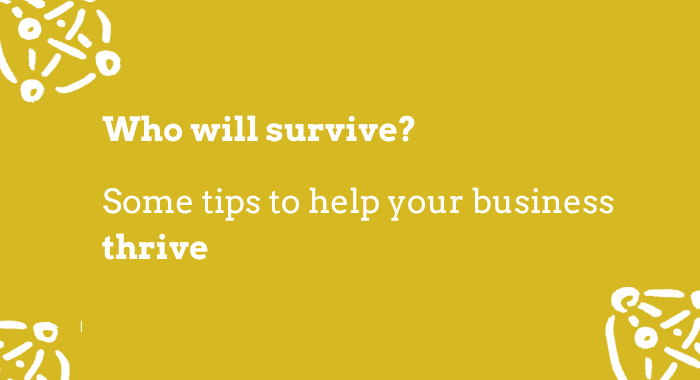Who will survive?

How are you feeling about the months ahead?
Normally the beginning of September fills me with enthusiasm and hope. It's a month of fresh starts, new pens, learning, and looking forward. This year feels different. I’m still full of plans and ideas, but there’s a lot of caution in the air.
Is it all doom and gloom? In this article I take a quick look at which businesses are most likely to survive the tricky times ahead
Tourism is a fluid industry: full of arrivals and departures of both visitors and businesses. There’s always a good number of new businesses starting, others changing hands, and some closing as their owners retire or move on. Over the last couple of years I’ve noticed a higher number of new openings: mainly holiday cottages.
During the 30+ years I've worked in tourism marketing, there have several recessions, terrorist attacks and wars, and threats such as Covid, and Foot and Mouth. They’ve all had an impact. It’s unlikely all businesses will survive over the next few years.
Some businesses won't make it
It’s realistic to assume around 25% of all current tourism and hospitality businesses will disappear by 2025.
Few existing businesses operate at full capacity year round. Some will close for longer Winter periods to save fuel costs, perhaps for ever.
Some will close simply because there’s not enough demand. Some businesses will go because they’ve failed to keep up with market changes. We’ll lose some brilliant businesses because not enough people know about them. Others will fade away because they’re just too vanilla to make an impact and excite anyone.
It's not all bad news
When the news is full of fuel price hikes and everyone around you is strapped for cash, it’s difficult to feel upbeat about the future. There is some good news. Not everyone is struggling financially. Many are, but not everyone.
Some are doing well financially. Many have significant savings. Those with limited incomes will make decisions about their priorities. Even when times are hard, some people would rather spend money on having a good time with friends and family than buying more furniture or topping up their pension.
Who will survive?
Which businesses are most likely to survive, – maybe even thrive over the coming months? Assuming they can deal with the fuel price increases, I’d say businesses with these characteristics are most likely to survive and do well:
Memorable: Small, flexible businesses that are memorable in some way, and stand out from the competition. These are often those who understand the strength of an emotional appeal and their marketing is anything but bland.
Attract loyalty: Established business that have built loyalty, credibility and trust. Businesses with high numbers of repeat visitors, excellent reviews, a good mailing list, and engaging social media accounts.
Adaptable and focused on certain markets: Businesses that have adapted to trends, and either offer something different or really focus on a particular market. They regularly demonstrate that they really understand their markets.
Added oomph: Businesses that are ready to add some oomph to their marketing, getting ready to appeal to discerning visitors who still have cash. These businesses see the value in plugging the leaks in their current marketing and are actively planning how they can thrive in the longer term.
Niche appeal: Businesses with a niche appeal, whether they offer a warm welcome to disabled guests, dog-owners, cyclists and other outdoor enthusiasts or more quirky interests.
Technology-confident: Businesses that make full use of technology to streamline their businesses, to help save time and energy, and make bookings easy and convenient for guests.
Collaborative: Businesses that work together with other local businesses to build a stronger profile and more interesting destination. They are often better at showing they really care – for their community, guests and the environment.
Greener: Off-grid or environmentally-friendly businesses are likely to do well, partly because their energy bills may be smaller, but also because more people want to understand how to do something similar and to learn more about green energy.
Attention-grabbing: Businesses that are good at getting publicity so they avoid the ‘muddled middle’. There are so many tourism and hospitality businesses that offer roughly the same thing. Those that shine are often the ones that journalists want to write about, influencers want to photo and visitors want to talk about.
Caring: Businesses that are built on a foundation of understanding and caring about human beings and have a passion for what they do. They are good places to work, with happy staff who are genuinely happy to greet and help visitors. This may sound glib but it’s surprisingly rare.
Good: Yes, businesses that are really good are more likely to survive. The best businesses adapt, and constantly find new and different ways to shine. Quality is remembered long after the price is forgotten*. It sounds obvious, but what are you actually doing to be better?
Feel good: Businesses that help their visitors feel better. That’s going to be very important in the coming months…
Don't feel downhearted if you're not sure that your business is any or all of these things. Over the next few months we're here to help you increase your chances of survival with a range of new workshops, marketing challenges, advice and support.
*Quote from Aldo Gucci


0 comments
Leave a comment